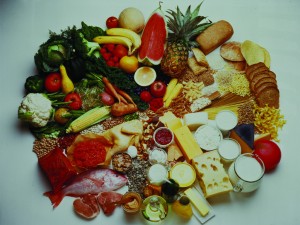Food Groups
What constitutes a healthy diet? what should a food plate carry? We are asked a lot of questions in this regard so we let’s talk about food groups and how they contribute to our overall health.
In totality there are 5 constituents of food groups. Dairy products, fruits, vegetables and legumes, meats and cereals. Processed foods, alcohol etc.. are clubbed as others category by many nutritionists and dieticians.
A healthy plate should carry a mix of all these 5 food groups with a larger inclination towards vegetables, legumes and whole grains.
Let’s see the composition of each of the food groups so as to get a better understanding:
- Dairy foods: The health professionals are divided largely on the consumption of this food group in an adult’s diet but most of them agree to include a small portion of this group to take care of our calcium and protein requirements.
a medium sized serving once a day of foods like curd, milk, yogurt, cottage cheese etc.. is necessary to be included.
Please Note: People with tendency towards stone formation should avoid consumption of dairy products since stones largely contain calcium combined with oxalate or phosphate and a larger helping of dairy products can hasten their recurrence.
- Fruits: An average person’s diet should contain at least a serving of one cup of cut fruits as they provide vitamins, minerals, phytonutrients (nutrients produced by plants) and dietary fibres (roughage). both fresh and canned foods can be taken but canned foods contain a high content of sugar so if possible include fresh fruits.
Please Note: for diabetics citrus fruits carry more benefits than fruits like mango or musk melon.
- Vegetables, Legumes and Beans: This food group should constitute at least 65% of your daily diet. Vegetables can be cooked, boiled or can be eaten as a salad too. Try to include them in your snacks to cut down on processed foods like Biscuits,Chips and Namkeens etc…
Please Note: Green leafy vegetables should be avoided by people with tendency towards stone formation. Legumes should also be consumed only in moderation.
- Grains or Cereals: Always choose whole grains or high fibre grains instead of refined grain products (like biscuits, cakes, pies, tarts). replace regular bread with brown bread or multigrain bread. replace the morning breakfast with oats . Avoid all purpose flour/refined flour and include more rice, wheat, durum wheat, barley in your diet.
Please Note: In individuals diagnosed with gluten intolerance, the requirement of grains should be fulfilled only through rice, millet, corn, buckwheat, oats (not contaminated with wheat– check the label).
- Meats, poultry, nuts & seeds, fish, tofu: Proteins are important for building muscles and organs. Haemoglobin and adrenalin are formed by the body through proteins. include lean meats, fish, nuts and seeds to fulfil protein requirements. For vegetarians- pulses, nuts and beans can take care of the required quantity.
